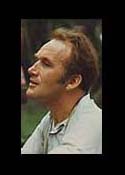 |
| Home Press Release Author Excerpts Chronology Reviews Photos Order Contact Appearances Multimedia |
From Chapter One, Pygmalion
Through Kenge, Colin realized a total and consuming passion for both the forest and the Pygmies who lived there, and he would remember the night he saw Kenge dance in the moonlight as a revelation. For it was on that night, amidst the music and the effervescence, in a momentary vision and a brief conversation, that he became convinced of the human capacity for love and for goodness.
From Chapter Two, The Wizard (1924 - 1930)
For Colin, that early mother-child bond among the Mbuti
was the best model for future relationships with family, friends, and
lovers; only when that bond was absent did children and parents find themselves
in conflict, with both sides feeling rejected and worthless. Then, in
the absence of that bond and when it was already too late, love had to
be demanded; then love became the burden Colin knew so well. "What
would we lose," he once asked, "if we gave our children something
different, something of what the Mbuti have to teach us about motherhood?"
From Chapter Three, Hothouse (1930 - 1942)
Colin had a jeweled soul, a deep, almost melancholic consciousness
of the riches that could be found in music, conversation, churches, and
the Scottish countryside, a consciousness his teachers wanted him to abandon.
His report cards complained of a lack of aggression. One read, "Colin
cannot stand up in the boxing ring and take his punishment like a man.
He must learn to assert himself."
From Chapter Four, Class (1942-1949)
Colin
loved men in the navy, despite the risks . . . but this was not a
coming out. That would never happen because Colin was what today
would be called pre-gay. He loved men without claiming a certain sexual
identity and during the 1960s, when the term "gay" gained popularity,
he refused to use it. He was not interested in being "gay" anymore
than he was interested in being "British."
From
Chapter Five, The Flute of Krishna (1949-1951)
Anandamayi Ma taught him that there was only that which Colin
made real for himself. She also taught him that something beautiful
and pure can emerge from something ordinary, inconspicuous or ugly, like
a lotus growing up from the mud, its beauty and purity unsullied by its
origin. Truth could be found in the the most unexpected places, in the
mountaintops of India or in the temples and ashrams, but perhaps just
as likely on a river bank, a city slum, or a farmer's field. It might
even be found in one person -- someone Colin might someday meet
-- in whom, deep inside, there was a brilliant light, an inner truth,
struggling to blossom.
www.anandamayi.org
http://www.anandamayi.org/bhakti/letters.htm
Sri Aurobindo's ashram consisted of offices, a library, a meditation
hall, dining area, guest quarters, and a private residence for the guru
and an elderly French woman called Mother
. With wild hair and a dictatorial style, she ran the place.
All communication with Aurobindo had to go directly through her.
Mother, originally named Mirra Alfassa, was born in Paris
in 1878, just six months before Aurobindo's birth in Calcutta.
She was frightening and spellbinding. Despite her age, she played a good
game of tennis and encouraged everyone to exercise. She failed Colin
in calisthenics and suggested he did not have the physical strength to
withstand the power of the Divine when it descended. In a strange way
she completed Aurobindo,for in her extraordinary strength as a
presence, as an administrator, as an athlete, she was the secular and
worldly manifestation of his sacred, spiritual power.
www.miraura.org
www.auroville.org
Page 2 of
Excerpts
Page 3 of Excerpts
© 2000
Roy Richard Grinker
